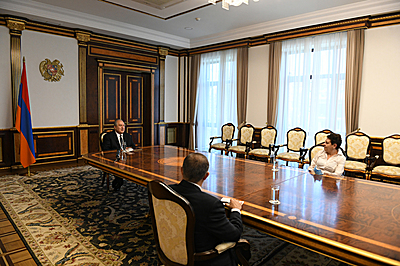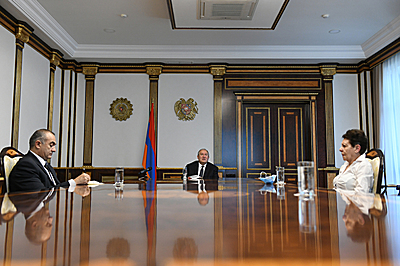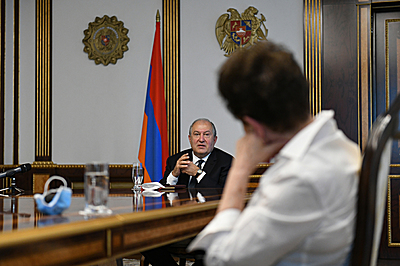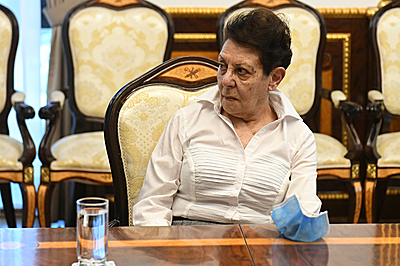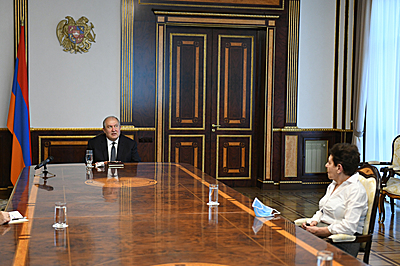Press releases
Regulations coherent with our national system of values should be adopted as a result of future public discussions: President Sarkissian spoke with the education expert Anahit Bakhshian about his concerns related to the Lanzarote Convention
President Armen Sarkissian hosted the education expert Anahit Bakhshian who sent an open letter to the President and expressed her concerns related to the ratification by the National Assembly of the Lanzarote Convention. Before taking up this topic, Armen Sarkissian once again spoke about the coronavirus pandemic and again urged the citizens to be alert and maintain the mandatory rules. “I feel obligated to use this opportunity and appeal once again to all our citizens, urging them to maintain all rules of social distancing. I don’t want anyone of our compatriots think that if 10 or fewer people die every day it can be viewed as normal. This is not normal. This is an enormous tragedy,” the President said. “Imagine that 5, 10, 15 families lost their loved ones. I would also like to take this opportunity to express my condolences. We absolutely have to be very careful, very strict and disciplined and do what is required and even more.”
President Sarkissian conveyed his words of gratitude also to the doctors for their difficult and dedicated work. “I would like to once again thank our doctors. Regardless of what’s going on, today we know that doctors are working day and night, endangering their own and their families’ life.
Hospitals should be perceived as bastions of health, strongholds. I express my deep gratitude to all doctors, from the heads of departments to the doctors on duty, to nurses and guards. Today, you are our heroes.”
Learning about Mrs. Bakhshian’s concerns related to the Lanzarote Convention, President Sarkissian noted at the outset that he too, has concerns.
Speaking about his signing-not signing the convention, the President presented the legal process and noted that after ratification by the National Assembly, the President receives not the convention but the law on the adoption of the convention by the National Assembly and has very limited authorities: first, to appeal to the Constitutional Court, if he believes that there is a contradiction to the Constitution. However, considering the fact that the Constitutional Court has already ruled out that there is no contradiction, the President is left with the second option – to sign it.
If it is not signed by the President, in several days it is signed by the Speaker of the NA and enters into force.
“We can view the Convention as an international law or a declaration of principles. However, each of 47 states which ratified it, adopted it with reservations on certain provisions. In our case, the National Assembly made no reservations, thus the Convention is adopted as it is. After the Convention is adopted, it is become a rule for any country. However, there is a long road from a rule to implementation,” the President clarified. “I wonder what will happen in 10 months or 10 years from now. I share everyone’s concern. I believe the most important is the following: will we have, as in the past, in some case, the so-called emotional expressions, chants which will be forgotten in a couple of days without proper discussions on future steps? This really needs the attention of our people. It is about our kids, their health, protection, education. I not only share your concern but can even say that my concern is bigger.”
The President noted that different countries chose different forms of application for the Convention. Each country can interpret the principles and implement them in its own way. There are countries which apply it provisionally in some schools; others engage also parents; others still start education from different ages.
According to President Sarkissian, no matter how common all human principles are, there are also national and cultural peculiarities which every country takes into consideration in the process of applying the Convention.
The President viewed ratification of the Conventional only as a start of the process which should be followed by public discussions related to the adoption of pertinent laws and these laws, taking into consideration national values, should outline necessary regulations and provide answers to a number of important questions.
“There are some matters of principle. First of all, matters related to abuse, its eradication,” the President of Armenia said. “It is a sensitive issue. Our culture compels people often to conceal it. But even if they don’t conceal it, when child is abused, which is a great tragedy in itself, we need to be very careful throughout the process. If abuse resulted in a kind of legal proceedings, mechanisms should be installed not to put a child under additional stress. Thus, along with eliminating abuse, we need laws, regulations, and mechanisms which will keep children away from going through all that again. It means we have huge problems related to abuse which need to be addressed.”
The President underlined important principles of the educational area which should be adopted in the future. “First, who is teaching? It is no secret that sometimes a teacher teaches several subjects. Teacher is called to represent values we want to be presented. If the teacher doesn’t represent them, he will do more harm than good.
Second issue: what are we going to teach? This is very important which means we need laws, textbooks and programs to re-train the teachers. It is not to be done in one day; it’s a huge work. Otherwise, we cannot allow for someone, even the most professional one, to enter the school unless certain standards are in place.
And, this is significant, how we are going to teach. And, very often teaching should be on the individual basis. The teaching process needs huge works. The role of parents and their opinion are very important. The Convention speaks clearly of the parents’ role, and parents have the right to express their opinion. There are countries which decided that the best mode of teaching would the engagement of parents.
And finally, education should be individual, taking into consideration each child’s, his or her family’s peculiarities because we can hurt or help the child.
We are in a situation when we had no public discussions on this topic, no concrete proposals were made, some of political figures spoke positively about this but all this needs to be systemized, turned into a law, an educational program.”
To find answers to the crucial questions mentioned above, the President stressed the importance of holding public discussions and constant attention toward the issues from stakeholders across the board and interested parties.
“I am concerned that all our energy will be wasted in talking and there is no more energy to educate and protect children, to define necessary regulations,” the President noted. “People who say that in a country, where the Convention has been adopted, it was not based on their national values, are wrong. We need first of all to define our own national and familial values. Then we can say, very well, in the 21st century the values will change somewhat, will be reconsidered. We are different from other countries.”
President Sarkissian proposed that Mrs. Bakhshian, as well as all individuals, organizations which are concerned, start with public discussions. “The real issue is not how it ends. Many of our compatriots think that this is the end – it is singed and done with. Today is the beginning of the process, to reveal who is genuinely concerned with the education and protection of children,” he underscored. We have to demand public discussions for each law – open, with wide participation, and on this we think alike. Regardless of whether I am president or not, I think like you and will follow you. Thinking like you means like our nation. No one is allowed to take this process lightly. We have values which we have to maintain at any cost.”
